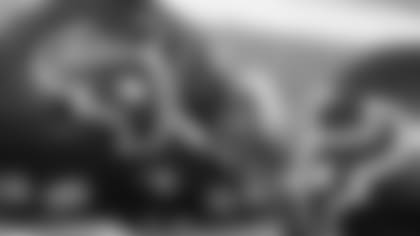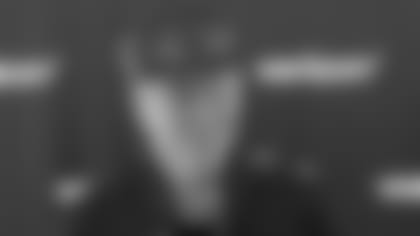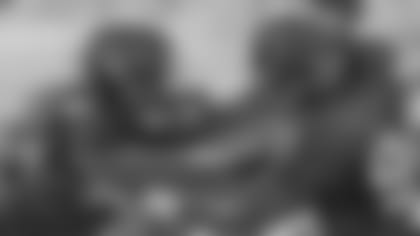* (on who Bob and John is named after)* "Well, as I said, when they win, they all claim him. Bob Baffert says he's named after him. Bob and John did have a workout yesterday morning, and Baffert said it was the best work he's ever had. We don't know if he's good enough to win or not, but certainly he sounds like he's going to be at his best and we feel like we've got a very good chance. It's very exciting for us, and I know Bob Baffert's more excited than I've ever seen him with any of the horses that we've ever had with him, so I think that's a good sign."
(on who the favorites are in the race and Bob and John's odds) "The early favorite will be Brother Derek. He won the Santa Anita Derby, and I'm guessing he'll be 3-1 or 4-1, or something like that. Then there are two other horses—Barbaro, who won the Florida Derby, and Lawyer Ron, who won the Arkansas Derby—and I'm guessing will probably be number two, and I'd guess they're going to be about 5-1, 6-1, and I think probably we'll be the next favorite at maybe 7-1 or something like that."
(on the intensity of the race) "Well, it's an exciting moment. You've got 150,000 people there, so the air is just filled with electricity. And when you have all of the people sing 'My Old Kentucky Home,' it's something. Everybody gets up and sings, whether they're from Kentucky or not, everybody sings that. It's just this great welling of vocals just coming from all around. Have you ever been some place where 150,000 people were singing? So, it's a unique experience.
"And then, insofar as the horse is are concerned, the horse will be famous from that day forward, and instead of being a horse that might be worth $10 million, which is probably where our horse is worth at this point in time if he wins the Derby, he's probably worth $50 million. So it's a $40 million moment, and that gets your attention. (laughing) It's almost enough to pay signing bonuses!
"All of that, and for the people on your farm that work with these horses every day, this is what they work for. This is their Super Bowl. It means everything to them, so you have that excitement; you know how important it is to everyone. There are 35,000 thoroughbreds born every year, and only one can win the Derby; and they have one shot at it, that's it.
"You need to have a horse that's run enough races so he's got a good foundation of conditioning and a horse that has run around two turns, because that's a different race than around one turn. And you're speculating as to how well they can go a mile and a quarter, because none of them have done that. A mile and an eighth is as far as any of them have run, so it's a new experience for all of them, and that makes it unpredictable. Then you throw in the fact that you've got 20 horses in there, it's a very large field, and all kinds of bad things can happen to you.
"So, really what you hope for is not that you'll have good luck, but that you won't have any bad luck. That's what you hope for—that you won't get bumped, knocked around, lose a couple lengths, have a bad break out of the gate. If you break poorly out of the gate, it's over; you don't have a chance then. The field's out in front of you and you've got so many horses to go through or pass; you really don't have much of a chance.
"So when you're watching the race, just watch and see if Bob and John breaks clean, that's that first step. If he doesn't, if he has a problem, if he loses a couple lengths on the break, it's a bigger hill to climb."
(on what starting gate he would prefer for Bob and John to have) "We want to be sort of in the middle if we have a choice. We'd prefer to have the speed horses inside, and Sinister Minister will be the one that's going to set the early pace. And that's one that Bob Baffert trains, too, but he just says that you can't control him; you can't get him to rate. He's going to run and if the other speed horses don't go with him and he gets out on an easy lead, we may have a problem catching him.
"But you hope the speed will be to the inside of you, because what happens is when you've got that large number of horses out there and they're all breaking, they come out of the gate, and then as they go forward they start moving down towards the rail because they don't want to stay out that wide. Well, that puts pressure on all the horses. If you're on the inside, you've got this wave of horses coming in on you and you can get closed off at the gate—or on the rail, rather—or boxed in and never have a chance. So we'd like to be anywhere from the fifth to the 12 th position, anywhere in there—post position. But horses have won from the 18
th position and 19 th position, so you can still do it, but it makes it a little more of a challenge."
(on his emotions in the last week with the NFL draft and now the Kentucky Derby) "Well, it's a different process now, in that really, we were working very hard and trying to make the best decision we could all of last week, and it was an important decision, but it was one that we controlled. Now, we're going into a situation in which something very important is going to happen, but we're not the decision-maker. We think we're in a good, competitive position and have a good chance to win, but a lot of it is going to depend on racing luck, and our horse and jockey are going to have to go out there and make it happen.
"We've got Garrett Gomez, though, who's perhaps the leading jockey riding. He's been exercising and working the horse—he did that yesterday—so we feel real good about that. So it's high anxiety as you lead up to that moment in time when the horse is leaving the paddock and you hear the call to the races and the bugle and they all start marching out there. Your heart's in your throat."
(on picking a trainer) "We pick trainers based on the types of horses we have and where we feel like they will be most successful running. On the West Coast, there are not a lot of race tracks, and it's very competitive. The races there, you're running against, typically, a little stronger competition than you are on the East Coast, where there are a lot more tracks, so you can spread the talent out more on the East Coast over more tracks. And the West Coast tracks are dryer, so they're a little faster. If you're going to have horses on the West Coast, they have to be the horses that can withstand a real fast pace and running on harder tracks.
"In the case of Bob Baffert, we think he's probably about as good as they come in getting horses ready for the Derby. He loves it; he lives for it. He's been there; he's won it multiple times, and he is the kind of guy that understands what is required of the horses and where you need to have your horse in order to compete.
"With Congaree, we had only run two times as a two-year-old and I think three times as a three-year-old. And so, one of the problems he had was he was pushing Congaree real hard, because they'll start out running five and a half or six furlongs, and then they'll run maybe seven furlongs. And then as a three-year-old, they'll run a mile, and then they'll go a mile and a 16 th and then a mile and an eighth. You're just building that foundation of conditioning so that they can handle those longer distances.
"In the case of Bob and John, he's run nine times. He's run around two turns, I forget the number, but I think it's maybe around four times or something like that. So, he's got more conditioning in Bob and John than we ever had in Congaree. So we feel better about his ability to handle the mile and a quarter.
"Now, on the East Coast, we use Todd Pletcher quite a bit; we use Billy Mott. We use Billy Mott a lot for turf horses. He's really good with turf horses and older horses. Todd Fletcher runs across the board. He handles young horses well, turf horses or dirt horses. But he's basically an East Coast trainer; he works the East Coast and in Kentucky. Bob Baffert is a West Coast trainer.
"So it depends upon the horse and whether we think they're a Derby candidate or not, and based on their confirmation. They need to be a little more upright in terms of their legs to do well on the West Coast. If they have too much of an angle at the ankle, they don't tend to do as well out on the West Coast and they tend to get their legs beat up a little bit out there. So it's a number of those factors that go into selecting a trainer."
(on if the horse is offensive or defensive) "He's an attacking horse, so I guess you attack on offense and on defense. I find him to be very reliable and I hope the opposition finds him to be very offensive."
(on how much has been invested in Bob and John) "What we have invested, we own his mother and of course we paid a stud fee and the stud fee was probably $200,000 or something like that. It's hard to figure out exactly what you've got invested because you have to think of a lot of different things. He's a home-bred which means we bred him and he was raised on our farm and that is much more important to us than when we go out and buy a horse and race him. Its always a thrill to have a good horse, but its much more difficult to have a home-bred because you've limited your pool of horses to those that you own whereas when you go buy one you can buy anything that is for sale among a pool of thousands."
(on almost losing the horse twice) "We had him in a package of four or five horses that we were selling. He kicked the stall and injured his foot so we had to take him out of the group and it reduced the price to $1 million—they valued him at $1 million. So then we had to keep him up in the stall for probably two or three months, so he couldn't get out and run around the fields so his conditioning wasn't as good. We still put him in the September yearling sale at Keeneland and we put a reserve on him at $500,000, so if he didn't get a bid over $500,000 then we kept him. He did not draw a bid over the $500,000, so for the second time in effect that we had him for sale, he didn't sell. Sometimes the best deal you make is the deal you don't make."
(on the drama of last week and it being more relaxed now) "It's a real relief because the focus is really on the horses up there. You don't have as many demands being placed upon yourself. It's nice to get out on the farm and sort of away from the big city. It's a very tranquil and pastoral type scene and very relaxing. It's been hectic, not just last week but for the last several months, as we've gone through this whole process. It's nice to get a little break and let things slow down a little bit."
(on having a home-bred horse and winning the Derby being more personal) "I've never thought of it that way. There are a lot similarities; you have to have a good team, a good organization and you have to make decisions that are long-term decisions and not short-term decisions, and you don't know the outcome for several years. Its just like football, we all get excited about the draft, but we don't know, we don't know how good our decisions were in this draft, we don't know how good any other teams decisions were because none of these guys have played. It's only going to be after they go on the field for several years that we'll find out.
"It's the same way with the horses. You look at the young horses when they're yearlings and they have never run. You have to make decisions as to which ones you keep that you are going to race and which ones you sell. We can't keep them all because we have probably 60 or 70 foals born every year. We've got about 250 horses total and if we weren't selling some of those horses, in a couple years, we'd have 500 or 600 horses. It's exponential. You have that as similarities.
"You have trainers in horse racing that are really working with the athlete; we have coaches in football really working with the athlete. But, we hire the trainers and we hire the coaches. You are trying to get results through other people and ultimately you are accountable in horse racing. I can't go to anyone else there, and in terms of football at the end of the day I'm accountable for what happens with our organization because I'm responsible.
"In both cases—and a lot of people have tried it in horse racing—they've tried to go out and buy winners. I guess sometimes people have tried that in football, you go out there and try to buy a team by spending more money on free agents or what have you. Typically that doesn't work, it certainly doesn't work in the horse business and I don't think it works in football. With horses, you grow them and hope that you do a better job of that than anyone else. In football, you try to grow through the draft and hope that you can pick young players that will ultimately be outstanding young players."
(on having a horse in the Kentucky Oaks) "Not this year. We have run in the (Kentucky) Oaks, but we have another horse that might run that same day depending upon if there is a race available for him [on Derby day]. Right now that is not set so I can't say for sure who that might be. We'll know that a little later this week."
(on his feelings now as compared to 2001 with Congaree) "This is the fifth time that we have run in the Derby and the second time with
a home-bred. Of course, we bred Fusaichi Pegasus who won in 2000. But I think
this year has been a little different in that we have seen this horse all along
as being our Derby horse. (Bob) Baffert identified him last year as being our
Derby horse and he has continued to make progress all along. I think we feel
a lot better about Bob and John than we did about Congaree because with Congaree
he was so fast he was hard to rate. We just couldn't get him to relax. He'd
get out on the track and he wanted to go, somewhat like Sinister Minister, maybe
not quite as bad. You get in these longer races and if you can't get the horse
to rate, they are just not going to be able to finish the race. In this case
we feel pretty comfortable."












